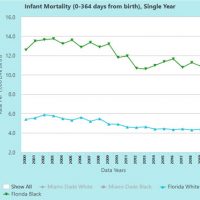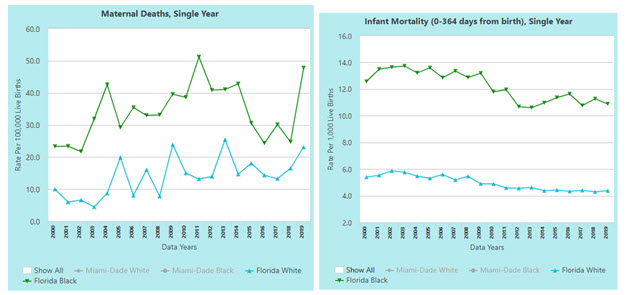
We at Freidin Brown, P.A. hope to bring to light a disappointing pattern of disparity in the healthcare treatment received by Florida’s expecting mothers as well as the medical implications that in turn affect the health of those babies. This pattern of healthcare inequity is something that Freidin Brown’s attorneys hope to disrupt by zealously seeking justice for their clients through the civil justice system.
As Reported on the Florida Department of Health website, the average maternal death rate for Black women was 2.5 times the maternal death rate for White women in the state of Florida between 2000 and 2019. In 2019 alone, the rate of maternal deaths per 100,000 live births was 29 for the State of Florida. Maternal deaths occurred at a rate of 23 per 100,000 White women compared to a death rate of 48 per 100,000 Black women. The average infant mortality rate in Florida was 6 deaths per 1000 live births in 2019. That number rises to 11 deaths per 1000 Black births and lowers to 4 deaths per 1000 White births.

Florida’s statute on medical negligence describes the standard of care as what is considered a “prevailing” professional norm in the relevant medical specialty area; in a birth injury case, the standard would be that which applies in obstetrics, gynecology, and other prenatal fields. Specifically, the standard of care is what another reasonably careful medical professional in the same specialty would consider acceptable and appropriate in light of the circumstances.
Like other medical malpractice cases, the complexity of Florida birth injury claims stems from the fact that you need to establish the specific way in which the practitioner breached the standard of care, and how that breach directly caused harm to the mother or infant. Such errors can include poor quality prenatal care, failure to run tests based on the presence of risk factors during the pregnancy, and mistakes in monitoring the babies before, during, and after the delivery.
Racial disparity in Prenatal Care
Proper prenatal care involves conducting tests and lab screenings when the mother has certain risk factors. Issues such as diabetes, hereditary and genetic disorders, and lifestyle factors may affect the fetus before birth and during the delivery process. As such, health care providers must be diligent and proactive in detecting medical conditions before they become dangerous.
It was noted that 7.5% of pregnant women received late term or no prenatal care, with 9.5% of Black women and 6.8% of White women identifying in this category. Women who see a health care provider regularly during pregnancy have healthier babies and are less likely to have pregnancy complications. About 76% of pregnant women in Florida received first trimester prenatal care in 2019. Demographically, 78% of pregnant White women and 68% of pregnant Black women were treated by a healthcare provider starting in their first trimester.
The average percentage of women who gave birth after having received adequate prenatal care, based on the Kotelchuck index, was 70.4% throughout the state of Florida in 2019. The index measures prenatal care based on when the mother began receiving prenatal care and the number of medical visits that occurred between initiation and delivery. Of the 70.4% of women in Florida, the percentage of Black women who gave birth after receiving adequate prenatal care was 64%, whereas 72% of White women who gave birth received adequate prenatal care.
The level of prenatal care that a woman receives from a medical physician can be attributed to a variety of different factors outside of a mother’s control, including accessibility of healthcare services and income disparities. Based on these numbers it could be inferred that there is an inequity of resources available to White women and Black women, placing the latter at a disadvantage when it comes to prenatal treatment.
Disparity among Maternal Morbidity
Severe Maternal Morbidity (SMM) is the presence of a complication during a delivery hospitalization. In 2019, Black women were almost two times as likely to experience severe maternal morbidities than White women, at a rate of 26 and 15 per 1000 births, respectively. Per the SMM Florida Department of Health Reports, such complications include:
- acute myocardial infarction
- aneurysm
- acute renal failure
- adult respiratory distress syndrome
- amniotic fluid embolism
- cardiac arrest/ventricular fibulation
- conversion of cardiac rhythm
- disseminated intravascular fibrillation
- preeclampsia or eclampsia
- heart failure/arrest during surgery or procedure
- puerperal cerebrovascular disorders
- pulmonary edema/acute heart failure
- severe anesthesia complications
- sepsis
- shock
- sickle cell disease with crisis
- air and thrombotic embolism
- blood products transfusion
- hysterectomy
- temporary tracheostomy or ventilation
Racial disparity among birth injuries in Florida
Preterm Low Birth Weight (weight below 2500 grams and gestational age less than 37 weeks) has been correlated with increased risk of infant death and can be caused by the maternal health risks listed above. In 2019, the percent of preterm births with low birth rates in Florida was 6.1%, affecting 9.8 % of Black mothers and babies and 5 % of White mothers and babies. In general, 14% of Black mothers gave birth to babies under 2500 grams compared to 7% of their White counterparts. Black women were three time more likely to have a baby weighing under 1500 grams than White women. The rate of birth disorders that were directly related to short gestation and low birth weight, resulting in infant deaths for the state of Florida was 0.9 per 1000 live births between 2017 and 2019. The rate dropped down to 0.6 among White births and increased to 2 per 1000 among Black births. For every 1000 births, 0.5 Black women lose their newborns from placenta, cord, or membrane complications whereas the comparable infant death rate for White babies was 0.2 per 1000.
Some birth injuries such as Hypoxic-ischemic encephalopathy (HIE) or Preterm Low Birth Weight can potentially be prevented when caught early and if the mother receives adequate prenatal healthcare and proper treatment during labor and delivery. It is evident from the statistics listed in this article that there is a disparity in the standard of healthcare provided to pregnant women and their newborns in the state of Florida based on race. In order to fix this system of medical racism we must address the acts of medical negligence that Black women are historically more likely to experience.
If you or a loved one sustained a birth injury as a result of negligence, contact our team of medical malpractice experts at Freidin Brown, P.A. for a free case consultation.




